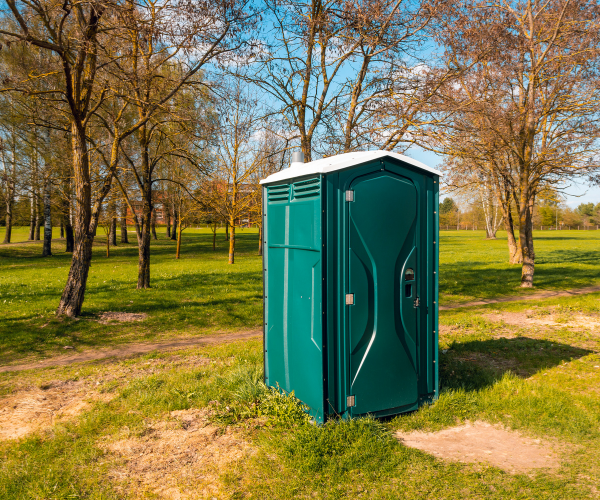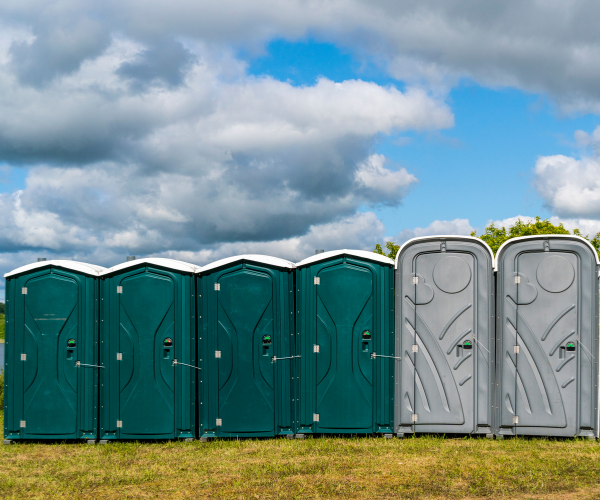Portable Toilets offer several eco-friendly advantages that contribute significantly to environmental conservation and resource management. One of the primary benefits is water conservation. Unlike traditional toilets, which can use several gallons of water per flush, standard portable toilets require little to no water, greatly reducing water usage in areas where they are used extensively, such as construction sites or large outdoor events. Additionally, the waste management process associated with portable toilets is designed to be more environmentally friendly. The waste collected in these units is treated and disposed of in a manner that minimizes environmental contamination. Many modern portable toilets also use green chemicals for waste breakdown and odor control, reducing reliance on harmful chemicals that can damage ecosystems if improperly managed.Portable Toilets also have the advantage of reducing the need for permanent restroom infrastructure in remote or temporary locations, which can often lead to land disruption and increased energy consumption during construction. By using portable units, event organizers and contractors can minimize their ecological footprint while still providing necessary amenities. Furthermore, the use of eco-friendly materials in the manufacturing of portable toilets has been on the rise. Recyclable plastics and materials with low environmental impact are increasingly popular in the industry.For those concerned about waste sustainability, some portable toilets are designed to convert waste into compost, further enhancing their green credentials. This approach not only reduces landfilling but also contributes to soil nourishment in various applications. Employing Portable Toilets is therefore an effective strategy for anyone looking to balance operational needs with sustainable practices.

Portable Toilet Rentals in Weaver, Georgia
Call today for a free quote (770) 215-0134
Portable Toilet
Fast, Easy, & 100% Free To Get Started
Over 20 Years Of Experience
With over 20 years of experience, our Portable Toilet company is a trusted name in Weaver. Our strong community ties and dedication to quality ensure customer satisfaction every time.
Dedicated to Quality Service
Our commitment to quality service sets us apart. Every unit is meticulously cleaned and maintained to exceed expectations, providing a seamless experience for all our clients.
Fast and Efficient Delivery
We prioritize quick delivery to accommodate your schedule. Our team ensures your portable toilets arrive promptly, ready for use at any event or site.
Reliable Portable Toilets in Weaver, Georgia
Call for a Free Quote Today
(770) 215-0134
Our Portable Toilet service in Weaver, Georgia, is a dependable choice for your sanitation needs. Locally owned and operated, we pride ourselves on our reliability and commitment to quality service. We cater to a wide range of events, from construction sites and parties to festivals and weddings. Our service area includes Weaver and nearby communities, ensuring that you receive prompt and efficient service wherever you are. Choose us for clean, convenient solutions tailored to your event's requirements.


Our standard porta john rental units are durable and reliable for any commercial build site, housing development, public works project, or remodel job.Features include dome lighting, grated floors, and an “In-Use” locking mechanism for privacy and comfort. Regularly maintained, inspected, and cleaned by FusionSite at your location.

Developed as an alternative to full ADA-compliant restrooms, the Liberty is a spacious, wheelchair-accessible unit that can also be promoted as a family-sized restroom. Includes a patented flat-floor system for easy wheelchair access and maneuverability.Handrails, paper holder, and rotary latch are designed for simple, intuitive end-user operation.

Portable hand washing stations are essential for keeping your work site sanitary and clean. Features hands-free foot pumps, liquid soap, and paper towels.Perfect for job sites without water hookups, these units can handle hundreds of washes between services.
We Proudly Serve
Standard Portable Toilets
Our Standard Portable Toilets in Georgia provide essential sanitation with a focus on comfort and functionality.
High Rise Portable Toilets
High Rise Portable Toilets in Weaver cater to elevated constructions, ensuring accessible hygiene services at any height.
Restroom Trailers
Our spacious Restroom Trailers in Weaver offer the ultimate in luxury and convenience for any event.
Roll off Dumpsters
Roll off Dumpsters in Weaver ensure efficient waste management for both residential and commercial projects.
Septic Tank Cleaning
Septic Tank Cleaning at Georgia Container guarantees efficient waste processing and maintenance for your systems.
Grease Trap Cleaning
Our Grease Trap Cleaning in Weaver ensures effective waste disposal solutions for local businesses.
Fencing & Barricades
Fencing & Barricades from Georgia Container provide secure boundaries and safety for all project sites.
Residential Storage
Residential Storage in Weaver offers secure and flexible options for your storage needs.
Weaver Portable Toilet and Waste Solutions
Obtaining a quote and scheduling delivery for a Portable Toilet is a straightforward process tailored to meet our clients' needs. Whether you're planning a large festival or managing a construction project, we make renting portable sanitation solutions easy. Start by filling out our simple form, asking for essential contact details like your first and last name, phone number, and email. With several strategically placed 'Get A Quote' buttons on our webpage, clients can quickly begin the rental process. We aim to respond promptly with a competitive quote and further assistance to ensure your specific requirements are met. As convenience is paramount, we also offer flexible delivery schedules, efficiently organizing installations without hindering your timelines. It's as simple as submitting the necessary details, and our team will handle the rest, ensuring a hassle-free experience that prioritizes customer satisfaction. The predictability of our process ensures that clients from Weaver and its surrounding communities receive the best solutions tailored to their unique events.

Experience the charm of Weaver with our premium Portable Toilet services. Whether you're hosting a community gathering at a local park or organizing an event near our scenic locales like the Weaver Riverfront, we provide the right solutions to meet your sanitation needs. Our clean, reliable, and convenient portable toilets enhance the guest experience for any occasion. Our portable toilets, a staple for outdoor events, reflect the essence of community charm. Ideal for family-friendly festivals like the Annual Weaver Harvest Fair or local sports meets, they boast cleanliness and functionality, blending seamlessly into the scenic Weaver backdrop. Our commitment to maintaining local traditions ensures that your event stands out with the best facilities. Local events in Weaver deserve exceptional support, and our portable toilets deliver it. With meticulous attention to detail, we ensure that each unit meets the highest standards of hygiene and comfort. Choosing our services means prioritizing guest satisfaction and seamless integration with the natural beauty that Weaver offers.
Why choose us in Weaver? Our locally-run business is committed to delivering top-tier portable sanitation solutions tailored to Weaver's unique needs. We align our services with the community's vibrant spirit, ensuring seamless integration.Our reputation as Weaver's top choice for Portable Toilet services is built on an unwavering focus on quality and customer satisfaction. Beyond products, we provide comprehensive support meticulously tailored to your event requirements.Join the countless satisfied customers in Weaver who rely on us for their portable sanitation needs. Whether for intimate gatherings or large public events, our experience and dedication guarantee the highest service standards for every client.
Your need for fast, reliable service ends here. We ensure timely delivery of Portable Toilets, critical for a successful event. Our experienced team expertly manages logistics, serving Weaver and its surrounding areas.Reliability and speed are combined for seamless service. With deep knowledge of local needs, we promise prompt delivery, even on tight deadlines. Whether for a construction site or a large festival, our dedication to timeliness remains steadfast.Empower your events with portable solutions you can trust. Our reputation for speed and reliability makes us distinct, delivering quality services whenever and wherever needed in Weaver, Georgia.
Learn More About Our Portable Toilets in Weaver
Renting a Portable Toilet in Weaver is designed to be a simple and user-friendly process tailored to meet various customer needs. Start by navigating our website, where you'll find clear 'Get A Quote' buttons prominently displayed. These buttons link you directly to our quote request forms, available at both the top and bottom of the page, ensuring easy access no matter where you are. To initiate your rental request, simply fill out the required fields in our form. We ask for basic contact information, including your first and last name, phone number, and email address. These details allow us to maintain effective communication with you throughout the rental process. Once your form is submitted, our team will promptly review your details and provide a comprehensive quote tailored to your specific requirements.For any questions or further assistance, you can contact our dedicated support team, ready to assist you with every aspect of your rental. Our process guarantees convenience and peace of mind, whether you're planning a large public event or a small private gathering.Our team ensures hassle-free service, delivering and setting up portable toilets at your specified location and timing. By clicking the 'Get A Quote' buttons, you open the door to reliable and professional service.
The delivery timeframe for Portable Toilet orders is an important consideration for event planners and site managers, and we aim to make this process as seamless as possible. Typically, once an order is placed, we coordinate with you to determine a delivery schedule that suits your specific needs. Our goal is to accommodate requested delivery times to ensure no disruptions in your event setup or construction timeline. For most standard orders, we recommend allowing at least 24 to 48 hours for delivery. This window ensures we can allocate the right resources and personnel to remotely assess the site for any potential delivery challenges.However, we understand that in some instances, urgent requirements may arise. We offer expedited delivery options in such cases, tailored to meet your immediate needs. Regardless of the situation, our reliable and efficient logistics team will work diligently to ensure your portable toilets are delivered and set up on time. Whether the event is large or small, we center our operations around timeliness and professionalism.Additionally, we offer flexible scheduling to accommodate varying event durations and satisfy individual client preferences. From weekday setups to weekend drop-offs, we strive to adapt to each circumstance, further enhancing the flexibility of our service. Our commitment to meeting and exceeding expectations makes us the foremost choice for Portable Toilet rentals in Weaver.
Yes, we can accommodate any type of event or construction project with ease. Our versatile offerings meet diverse requirements, including festivals, sporting events, weddings, corporate gatherings, and family reunions. We supply luxury restroom trailers, standard porta potties, roll-off dumpsters, fencing and barricades, holding tanks, ADA-compliant units, portable sinks, and hand sanitizer stations. These solutions ensure your event or site operates seamlessly, regardless of its size or scope.Our team excels in delivering these amenities with accuracy and dependability, guaranteeing client satisfaction from setup to teardown. Whether you're hosting a large public festival or an intimate private event, we customize our services to meet your specific needs. For the construction sector, we provide sturdy, site-ready portable toilets and essential infrastructure, boosting your project's efficiency and compliance.Our unwavering commitment to quality and service has made us a trusted partner for event organizers and contractors, dedicated to meeting all sanitation needs with professional and hassle-free solutions.

